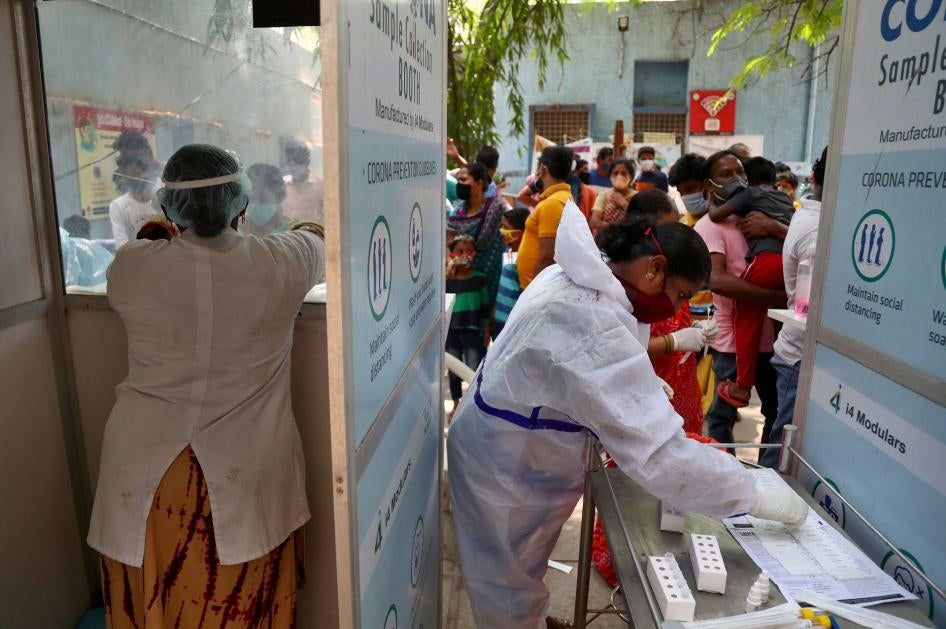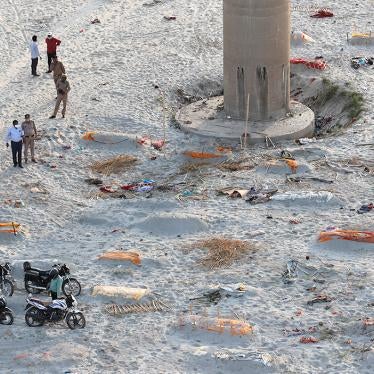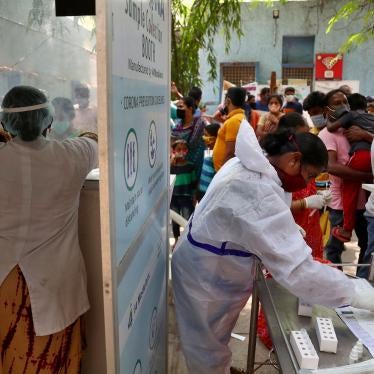(New Delhi) — As India reeled under a deadly second wave of COVID-19, with massive shortages of medical supplies and hospital beds, authorities finally understood the need to rapidly vaccinate the country’s billion-plus population. Many people live densely crowded together, with little access to proper healthcare. Vaccines play an essential role in preventing severe illness from COVID-19.
On May 1, the central government opened up COVID vaccinations to those 18 and older. But without adequate preparation — something that has routinely marred the Bharatiya Janata Party-led administration’s response to the pandemic — it soon became apparent that India needed to reset its vaccine policy, which is riddled with access and inequity problems.
India has one of the world’s largest capacities to manufacture vaccines, but the central government’s failure to place orders in time, complexities around licensing Western vaccines and overreliance on just two domestic manufacturers has led to a massive supply crisis. As of early May, India was vaccinating half as many people daily as it was in early April. Several state governments have temporarily suspended vaccinations for the 18-to-44 age group because of shortages.
Although India has fully vaccinated over 40 million people, and while over 150 million have received one dose, they are a small percentage of the population.
Ensuring an adequate supply of safe and effective vaccines is crucial. However, as India’s vaccine rollout policy illustrates, merely increasing the supply will not be enough to ensure universal, equitable and affordable access to vaccines. There are serious concerns over delivery approaches that are exclusionary and may lead to greater inequity.
The central government’s strategy effectively allows vaccine manufacturers to set differential prices and exacerbate regional inequities.
While 50% of the vaccines produced in India are reserved for the central government to be distributed free through public health facilities, the rest are for sale to state governments and private hospitals and entities. This means companies can decide at what price to sell to state governments and private entities, and richer states may be able to buy more vaccines than poorer ones.
The shortage, coming amid a high count of new cases and deaths, also led the government to temporarily halt all export of vaccines. That has created a ripple effect in many developing countries that relied on India to supply vaccines for their population.
The Indian government is taking some steps toward relaxing rules for foreign vaccine makers to sell in India. Dozens of countries, including the U.S., have said they will support a proposal by India and South Africa at the World Trade Organization to temporarily waive some intellectual property rights for COVID-19 related vaccines, diagnostics and therapeutics. The proposal, if passed, could unlock new production capacity and contribute toward greater vaccine access globally.
The government has made registration for the 18-to-44 group available online only via CoWIN, the Indian government portal for COVID vaccination, exposing policies that are incredibly out of sync with the populace. The requirement for online registration for vaccination means that it excludes millions without access to the internet or smartphones, those who are not literate, and particularly those from rural and poor communities. Women and marginalized groups tend to have even less digital access. The government defended its decision, telling the courts that “citizens who do not have access to digital resources can take help from family, friends, NGOs.”
The government’s liberalized pricing strategy is also a significant departure from its universal immunization program, which began in the 1970s, under which the central government procured vaccines and distributed them through the states for free — and saved a significant number of young lives. The government should ensure access to vaccinations for all eligible people by advertising and allowing walk-in access and removing all barriers, including the need for identity documents.
Where there is considerable vaccine hesitancy, the government should reach out on a massive public health scale to clearly communicate safety and risks around the vaccines.
Inadequate investigations into deaths among people who were vaccinated raise questions about the government’s commitment to transparency, which can contribute to vaccine skepticism. The government should follow the recommendations laid out in the Lancet Task Force report on India, including monitoring, collating and transparently reporting on all adverse events following inoculation. This would help build trust with the local populations during this public health crisis.
In a pandemic, a short-sighted policy endangers everyone. India can figure out an equitable and accessible vaccination policy. It has done it before and must do it again — before more lives are lost.








